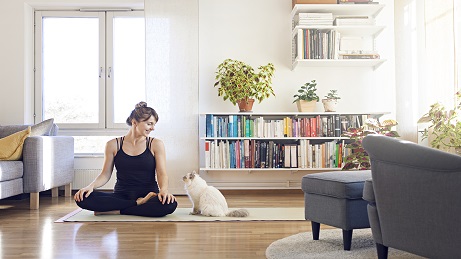
Pain
Don’t let aches and pains cause sleepless nights...
Is pain keeping you up at night? Perhaps you have back problems which stop you from sleeping or maybe you’re sleeping in the wrong position for your posture. Take a look at our actionable tips and advice to see how you can improve your sleeping pattern if it’s affected by pain.
-
One
-
Two
-
Three
-
Four

Is your sleeping position bad for you?
Hope Bastine, Mindful Sleep Psychologist at Simba Sleep
Between the ages of 18 and 65, the recommended number of hours sleep is between seven and nine. And during those hours of deep sleep, many of us move around and change positions. Our bodies need these hours of sleep to rest and repair our bodies, ready for the new day.
The position you sleep in can affect how well rested you feel, so here we break down the different sleeping positions and whether they’re good or bad for you.
You sleep on your back
If you sleep on your back, you’re one of few. This is one of the less common sleeping positions, and unfortunately, is more likely to make you snore or suffer from sleep apnoea, which can affect your quality of sleep.
But it’s not all negative, sleeping on your back is easy on your spine and neck.
You sleep on your side
If you’re a side sleeper, you’re less likely to have breathing problems, such as snoring and sleep apnoea. Alternating between your back and sides is usually more comfortable and less stressful to the spine than sleeping on your stomach too.
You sleep on your front
Unfortunately, this is the worst position you can sleep in, especially if you suffer from lower back pain. It doesn’t provide any support for your spine and most people twist their head to the side to breathe. Although this position is less likely to make you snore or suffer from sleep apnoea, it’s not recommended to sleep this way.
It’s better to sleep in a position which supports the curvature of your spine, like on your back or your side.
You fall asleep watching TV
Falling asleep in front of the TV is bad for your posture, and you’re more likely to snore. This is because you’re not sleeping in a good position. You’re also less likely to enjoy the restorative sleep you need sitting in a chair, so it won’t be giving you the quality of sleep you’d get in a bed.

Stretching – Yoga poses to help you sleep
Hope Bastine, Mindful Sleep Psychologist at Simba Sleep
Practicing yoga brings your mind and body together. It can also reduce stress and help you get rid of unwanted tension. Some people claim that yoga helps you sleep for longer, improve your sleep quality and make you feel better during the day too. So if you’re struggling to drift off at night, why not work yoga into your bedtime routine?
Here’s a few poses to try.
The forward fold
This forward bend allows you to relax your neck tension and gently stretches your hamstrings, hips and calves.
- Stand with your feet hip-width apart and inhale deeply
- Slowly reach down. Don’t worry if this isn’t possible; touch your thighs or calves instead
- Grab your elbows whilst you hang, swinging gently from left to right
- Hold for up to 15 seconds
Legs up the wall pose
Elevating your legs is a great move if you work on your feet. This simple stretch helps re-circulate your blood flow. You can do this pose easily on your bed or floor too!
- Lie on your back and get comfortable, ensuring your neck is supported
- When you're ready, prop your legs up against the wall
- Stretch your arms out on either side of you, reach with your fingers as though you could touch the other walls and breathe
- Relax into the position, hold it for at least 30 seconds and focus on your breathing
The cobra
A far less dangerous pose than it sounds! The cobra pose is a move to complete on your front and will strengthen your core, re-align your spine and decrease stiffness in your lower back.
- Lie on the ground on your front with your legs straight, arms by your sides and palms facing up
- Raise your torso up by pushing yourself away from the ground with your hands
- Breathe slowly, focusing on your inhales and exhales
- Release yourself by lowering your chest and forehead to the ground
Happy baby
A great pose to try before bed, especially if you’re having trouble sleeping.
- Lie on your back and grab your feet above your torso
- Rock from side-to-side
- Take a few breaths
- If you’re unable to hold your feet, try looping a dressing gown tie over your feet and holding it in your hands
Child’s pose
One for the morning as well as before bed, child’s pose is a rest pose during a yoga sequence. This pose aims to provide a sense of calm and stability.
- Get into place by kneeling hip width apart
- Bring your hands down in front of you
- Lay your torso low so your forehead touches the floor
- Focus on your breathing during these stretches

Is medicine affecting your sleeping pattern?
Justin Hayde-West, Chief Pharmaceutical Officer’s Clinical Fellow
The medicines we take to tackles our colds, allergies and other conditions can all have a surprising impact on our sleep. They can affect us all differently; some may prevent us from falling asleep, whilst others can cause drowsiness. So it’s important to always read the label first. Here we share how common medicines could impact our sleep.
Antihistamines
We often take antihistamines to relieve symptoms of allergies, like hay fever or hives. They can also be used to prevent motion sickness and help with insomnia. But with all medication, there can be side effects. Antihistamines can cause you to feel drowsy when you first start taking them, but the body usually adapts to reduce this effect if you take them regularly. Taking antihistamines will help you fall asleep for a few nights, but regular use for insomnia isn’t recommended. If you’re not sure whether antihistamines are suitable for you, or if you’re taking any other medication, you should discuss with your local pharmacist before you take them.
Painkillers
Over-the-counter painkillers often contain caffeine, to help us feel more alert and awake when we’re under the weather. There are some caffeine-free painkillers, so make sure to check the ingredients before you to take them to avoid any unnecessary sleep disruptions. If you take painkillers with caffeine in before going to bed, you might find it harder to fall asleep and notice that your total sleep time is reduced.
Antidepressants
Antidepressants work by increasing levels of certain chemicals in your brain, such as serotonin and noradrenaline. These chemicals are known to impact mood and emotions. Taking this kind of medication can affect your body clock and sleep pattern as well. Antidepressants are used to treat depression and other conditions, like anxiety and post-traumatic stress disorder (PTSD). They can also be used to treat people with long-term, chronic pain.
There are many types of antidepressants and these can all affect our bodies differently. Some can disturb your sleep whilst others cause drowsiness. And it can be difficult knowing whether it’s your condition or tablets which are causing you sleepless nights. Try taking them in the morning to see if this helps with disturbed sleep or in the evening if you are experiencing drowsiness.
If you’re worried about the effects of any medicines you’re taking, make sure you speak to your local pharmacist or GP.

Coping with back pain in bed
Dr Tom Charlton, Clinical Fellow
Back pain is very common, with around one in three of us suffering from it each year. And when you’re experiencing aches and pains, it can keep you awake and affect your sleep. If this all sounds too familiar, don’t fret! Luckily there are ways you can relieve your back pain and avoid it getting worse.
Sleeping with back pain
Certain sleeping positions can place extra pressure on your neck, hips and lower back – all of which can lead to back pain. But by making simple changes in your sleeping position, you can take strain off your back. If you sleep on your back, place a pillow under your knees. This can help your spine maintain its natural curve. Sleeping on your stomach can be tough on your back, so try to reduce the strain by placing a pillow under your pelvis and lower abdomen. And if you can sleep on your side, try to tuck a pillow between your knees.
Treatments you can try yourself
Usually, lower back pain gets better in a few days or weeks and often you don’t need to see your GP. There are a few things you can do to relieve your aches:
Stay active
It’s really important to keep moving and continue with your day-to-day activities, like going to work. There’s no need to wait until you’re pain-free. Carrying on with your normal activities can help take your mind off the pain and get yourself back into a routine.
Take pain relief
If you’re struggling with back pain, taking ibuprofen can help relieve it. You can buy this medicine over-the-counter.
Ibuprofen isn’t suitable for everyone though, so speak with your pharmacist or GP before you take them. Taking pain relief can also impact your sleep, so make sure you read the leaflet before you try anything. For example, some over-the-counter painkillers may contain caffeine to help us feel more alert and awake when we’re under the weather.
Relax
Trying to relax is an important part of easing the pain. Worrying about your back pain could also make it worse, and feelings of stress, worry and anxiety can stop you from sleeping too , so it’s important to try and stay positive.
If your problems with your back persist, you should see your GP as you may need to see a specialist.
Say goodbye to sleepless nights from aches and pains
Struggling with a muscle, bone or joint problem can be frustrating, especially when it’s stopping you from sleeping. If you’ve tried our tips and you’re still struggling, it may be worth looking at different self-help measures and speaking to your GP to see what else you can do.
Is your back giving you problems?
Our back pain factsheet gives information about what might be causing your back problems and offers simple self-help measures.
Fast help with muscle, bone and joint problems
With our health insurance, you can usually skip GP referral to get the help you need from our physiotherapists for problems relating to your muscles, bones and joints.


